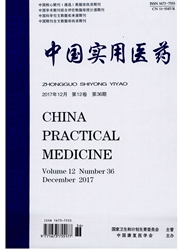

 中文摘要:
中文摘要:
目的观察瑞舒伐他汀对急性冠状动脉(冠脉)综合征(ACS)患者经皮冠状动脉介入治疗(PCI)术后的临床疗效。方法 108例接受PCI治疗的ACS患者,随机分为A、B、C三组,各36例。A组术前每晚口服40 mg阿托伐他汀,术后每晚口服20 mg,连续服用6个月;B组术前每晚口服40 mg辛伐他汀,术后每晚口服20 mg,连续服用6个月;C组术前每晚口服20 mg瑞舒伐他汀,术后每晚口服10 mg,连续服用6个月。观察三组治疗前后血脂水平及心肌酶谱水平的变化情况。结果 C组治疗后血脂水平及心肌酶谱水平下降程度均明显优于A组和B组,差异具有统计学意义(P〈0.05)。结论瑞舒伐他汀对ACS患者PCI术后降脂和心肌酶作用较等效剂量的阿托伐他汀或辛伐他汀效果更好。
 英文摘要:
英文摘要:
Objective To observe clinical effect by rosuvastatin after percutaneous coronary intervention(PCI) for acute coronary syndrome(ACS) patients. Methods A total of 108 ACS patients who received PCI were randomly divided into groups A, B and C, with 36 cases in each group. Group A received preoperative oral administration of 40 mg atorvastatin and postoperative 20 mg for 6 months; group B received preoperative oral administration of 40 mg simvastatin and postoperative 20 mg for 6 months; group C received preoperative oral administration of 20 mg rosuvastatin and postoperative 10 mg for 6 months. Changes of blood lipid and myocardial enzyme levels before and after treatment were observed in all groups. Results After treatment, group C had more obvious blood lipid and myocardial enzyme declined levels than groups A and B, and their difference had statistical significance(P0.05). Conclusion Rosuvastatin shows better effect in decreasing blood lipid and myocardial enzyme after PCI than equivalent dose of atorvastatin or simvastatin.
 同期刊论文项目
同期刊论文项目
 同项目期刊论文
同项目期刊论文
 期刊信息
期刊信息
